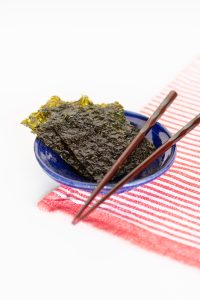 If you want to boost your nutrients, reap many benefits and add a dash of the unique to your diet, add seaweed. While seaweed is good for digestion for most people, some types of seaweed can cause problems for people with certain digestive issues. There are seven types of edible seaweed, wakame, kombu, nori, dulse, hijiki, Irish moss and sea lettuce. The edible seaweed is also classified by color, green algae, brown algae, red algae and blue-green algae.
If you want to boost your nutrients, reap many benefits and add a dash of the unique to your diet, add seaweed. While seaweed is good for digestion for most people, some types of seaweed can cause problems for people with certain digestive issues. There are seven types of edible seaweed, wakame, kombu, nori, dulse, hijiki, Irish moss and sea lettuce. The edible seaweed is also classified by color, green algae, brown algae, red algae and blue-green algae.
Seaweed helps boost beneficial “belly bugs.”
Your gut microbiome, the collection of microbes in your gut, determines a lot about your health, both mentally and physically. There has to be the proper balance of beneficial microbes to harmful ones, or the harmful ones will take over and you’ll end up sick. For a healthy digestive system and to promote beneficial microbes, you need adequate fiber and polysaccharides. Not only is seaweed a good source of fiber, but it also promotes a healthy gut. The fiber feeds the beneficial bacteria, while the polysaccharides, some sugar in seaweed, boost the growth of beneficial gut microbes.
Seaweed can also exacerbate some digestive issues.
While seaweed can be good for most people, some people shouldn’t eat it. People who often have digestive issues or who have bacterial overgrowth in the small intestines, shouldn’t eat it. The carrageenan in some seaweed can cause inflammation. Irish moss is one seaweed high in carrageenan. If you have a thyroid-related health issue, such as hyperthyroidism or hypothyroidism, the high iodine content can interfere with your medication. Since seaweed is high in fiber, it aids digestion, but like any fibrous foods if you eat too much it can cause digestive issues, such as bloating, constipation or gas.
Seaweed helps protect the body, including the digestive tract, with antioxidants and anti-inflammatory properties.
Free radicals cause oxidation. Oxidation can cause damage to your cells, but the food you eat can provide antioxidants that prevent that from happening. It also contains anti-inflammatory properties, which fight inflammation. Free radicals are both the cause and result of inflammation, so if you have one, you have the other. Seaweed contains potent antioxidants that both help eliminate free radicals, but also reduce inflammation, which can help prevent serious colon diseases and other digestive issues. Scientists have now proven that nutrients are responsible for fighting inflammation of the gut.
- A type of seaweed that grows close to the Florida Keys has been found to be extremely important for fighting inflammatory digestive diseases and colon cancer.
- The polysaccharides found in seaweed not only promote the growth of beneficial bacteria, but they also increase short-chain fatty acid—SCFA—production. SCFA nourishes and supports the cells lining of your gut.
- You also should check the source of the seaweed to avoid contamination from copper, nickel, other heavy metals and radiation caused by the Fukushima nuclear accident that occurred in 2011. Consider land based seaweed farms.
- Adding sugar kelp—a type of seaweed—to beans can help control a gassy response. It breaks down the raffinose sugars beans contain, so they’re easier to digest and less likely to cause bloating or gas.
For more information, contact us today at Wellness On A Dime Coaching
